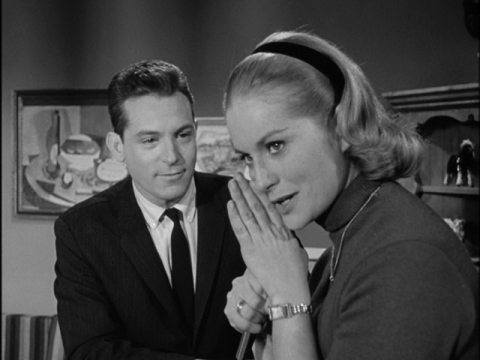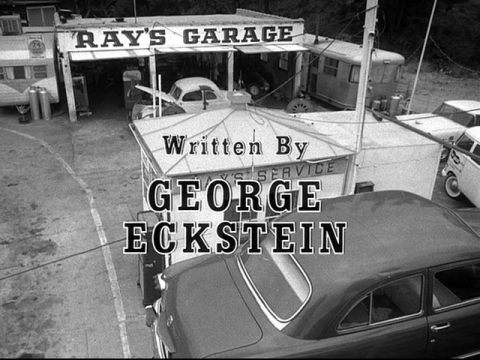QM Minus Two
September 17, 2009

Paul Burke and Nancy Malone in Naked City (“Requiem For a Sunday Afternoon,” 1961)
The grim reaper has been working overtime this month: Larry Gelbart, Army Archerd, Patrick Swayze, Henry Gibson, Zakes Mokae, Mary Travers, and the estimable Dick Berg, who granted me a good interview last year. One of the weird coincidences in television history is that many of the major players – actors, writers, directors, crew – from the Quinn Martin factory are or, until recently, were still alive and available for interviews. If you were writing about Bewitched or Ben Casey, you were out of luck, but if you tackled a QM show you could compile a decent production narrative by way of oral history.
Now death finally seems to be catching up with QM, claiming Philip Saltzman (a producer of The FBI and Barnaby Jones) a couple of weeks ago, and now both Paul Burke and George Eckstein over the weekend. Burke, of course, was the second star of QM’s World War II drama 12 O’Clock High, replacing Robert Lansing, whom Martin found too diffident and remote to headline his series. Burke had a more likeable, down-to-earth quality than Lansing, although he was a less gifted actor. He was Leno to Lansing’s Letterman.
Burke had also been the replacement star of Naked City, taking over for James Franciscus in what the New York Times’s obituarist, Margalit Fox, called Naked City’s second season. Technically that’s accurate, but Fox’s phrasing reminded me of how it has never felt true. In my mind, there were two Naked Citys, the half-hour and the subsequent hour-long version. Both sprang originally from the pen of the prolific Stirling Silliphant, and both took great advantage of the practical outdoor locations available in New York City. But the casts were different (save for a pair of supporting players), a full TV season separated them, and the extended length of the later episodes occasioned a major shift in tone.
The Los Angeles Times’s obit for Burke called Naked City “gritty,” but that’s more true of the Franciscus version, a lean, action-centric genre piece that turned Manhattan into a giant playground for foot and car chases. The half-hour City had more in common with other contemporary half-hour crime melodramas – there were a wave of these made in New York City in the late fifties, including Big Story, Decoy, and Brenner – than with its own sixty-minute incarnation, which told character-based stories in a much wider tonal range. The Stirling Silliphant of the first Naked City was the terse pulp writer of Alfred Hitchcock Presents and late films noir (The Lineup, Five Against the House). By 1960, when the hour Naked City debuted, he was the loquacious beat poet of Route 66, a personal writer working an in an ever more idiosyncratic voice. Because not even Silliphant was prolific enough to write both shows at once, he gradually delegated Naked City to Howard Rodman, whose scripts were even more lyrical and offbeat.
If I haven’t said too much about Paul Burke, it’s because he always struck me as a passive personality, just on the good side of dull. That sounds like a knock, but it may have made Burke ideal for the hour Naked City, which required the regulars to step aside most weeks to let some grand stage actor – Eli Wallach or Lee J. Cobb or George C. Scott – take a whack at one of Silliphant’s or Rodman’s verbose eccentrics. One of the best things about Naked City was the relationship between Burke’s Detective Adam Flint and his girlfriend Libby, played by Nancy Malone, that resided on the margins of the show. The pair were friends as well as lovers, and quite clearly (thanks less to the dialogue than to the sidelong glances between the two actors) sleeping together. Adam and Libby were one of TV’s first modern, urbane, adult couples: Rob and Laura Petrie without the farce. Burke may have done his finest work in those scenes.
*
George Eckstein produced Banacek, Steven Spielberg’s Duel, and a number of other important television movies of the seventies. But I suspect more TV fans remember him as a story editor and primary writer for Quinn Martin’s two finest hours, The Fugitive (for which Eckstein co-wrote the two-hour series finale) and The Invaders.
Last month Ed Robertson, author of The Fugitive Recaptured, chastized me for expressing only modest enthusiasm toward Philip Saltzman’s Fugitive episodes, which included one of Ed’s favorites, “Cry Uncle.” Well, I’m relieved to report that Eckstein wrote some of my favorite episodes, chiefly “The Survivors” (about Richard Kimble’s complex relationship with his in-laws), “See Hollywood and Die,” and “This’ll Kill You.”
The latter two paired Kimble, the innocent man on the lam, with actual hoodlums of one variety or another, allowing Eckstein to zero in one of the more intriguing aspects of the show’s premise: how does one live among the underworld of criminals without becoming one of them? “This’ll Kill You” showcases Mickey Rooney as a washed-up, mobbed-up comedian, whose infatuation with a treacherous moll (the great Nita Talbot) leads him to his doom. It seems like every TV drama of the sixties wrapped a segment specifically around Rooney’s fireball energy; some were dynamite (Arrest and Trial’s “Funny Man With a Monkey,” with Rooney as a desperate heroin-popper) and some disastrous (The Twilight Zone’s “Last Night of a Jockey,” with Rooney as, well, an annoying short guy). Eckstein’s seedy little neo-noir gave Rooney some scenery worth chewing.
I interviewed Eckstein briefly in 1998 while researching my article on The Invaders. Eckstein is only quoted in the published version a few times, because he was incredibly circumspect. Not only would he not say anything bad about anyone, he’d barely say anything at all about them. I suspect Eckstein agreed to talk to me only because I had gotten his number from another gentleman of the old school, Alan Armer, who had been his boss on the two QM shows. I wish I could have asked him more – especially now, as I am just reaching the point in the run of The Untouchables (which I had never seen before its DVD release) when Eckstein, making his TV debut, became a significant contributor. It’s always a race against time.
